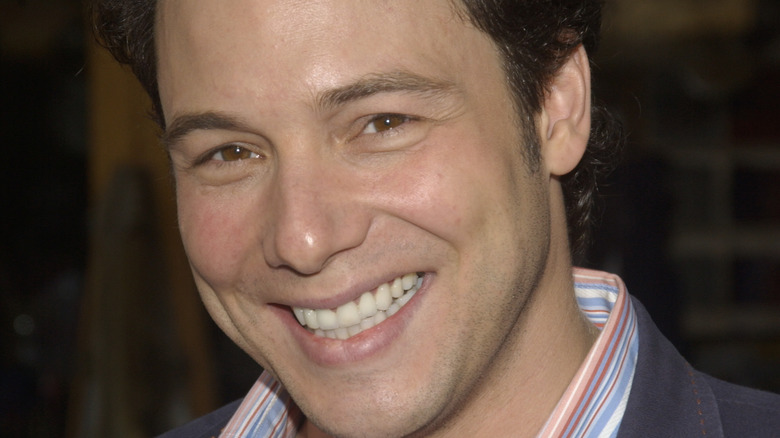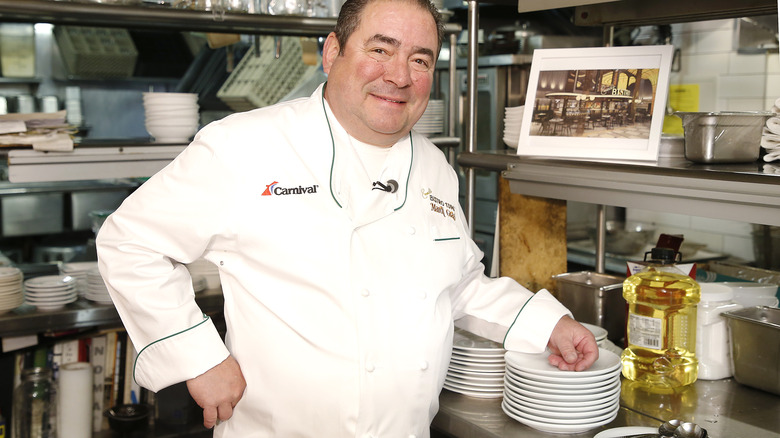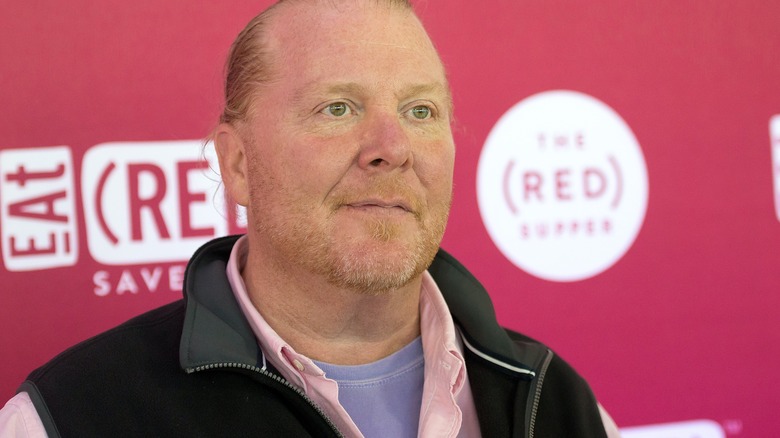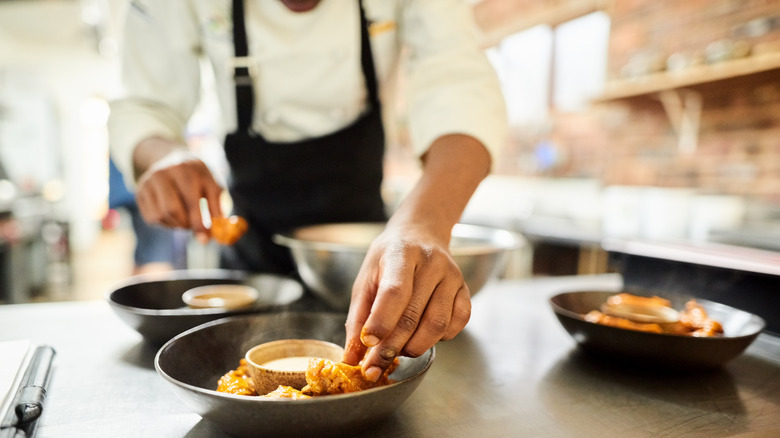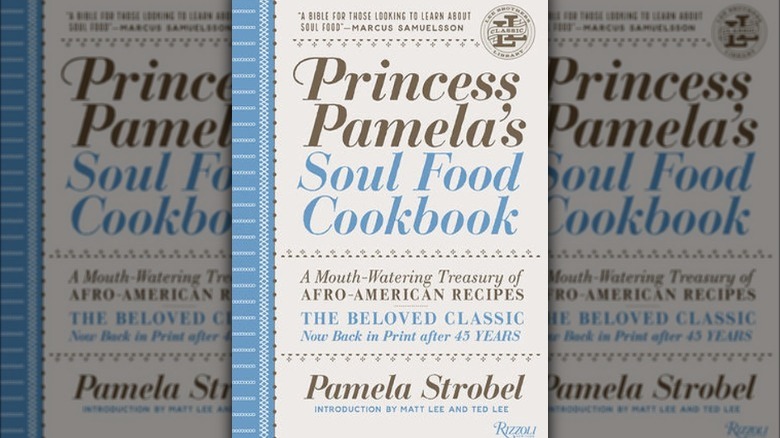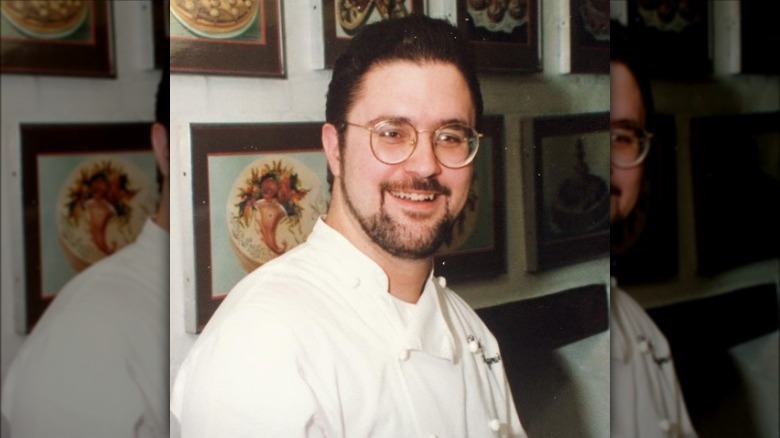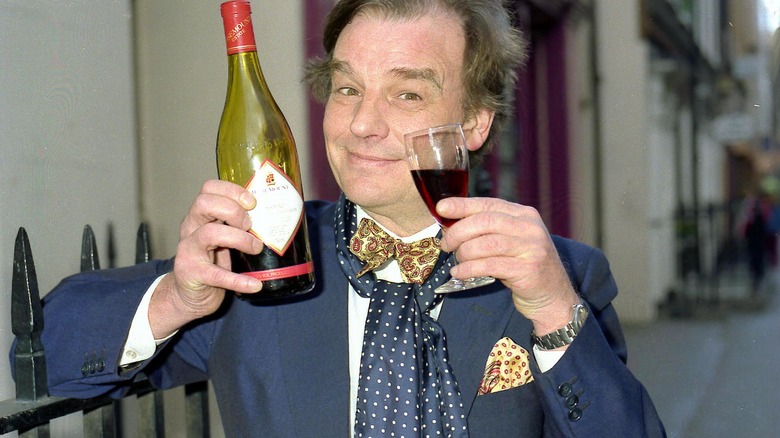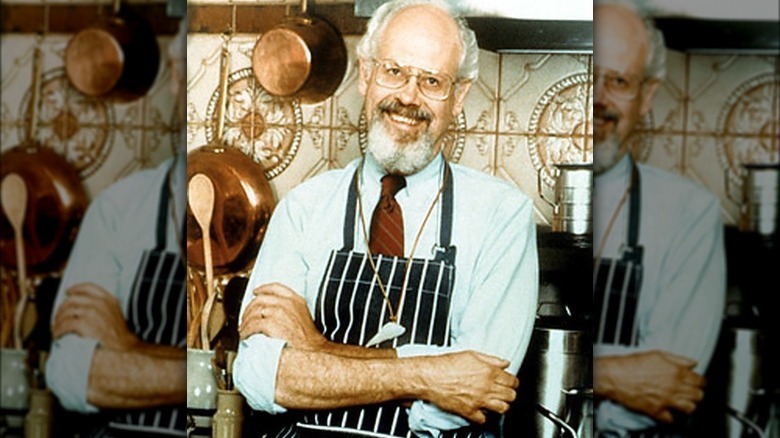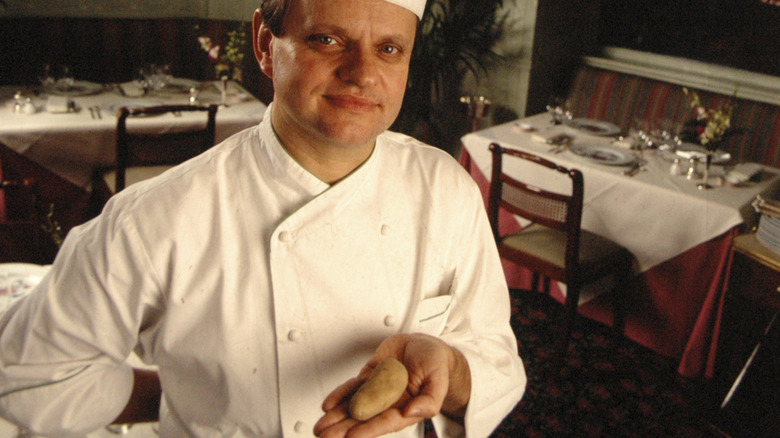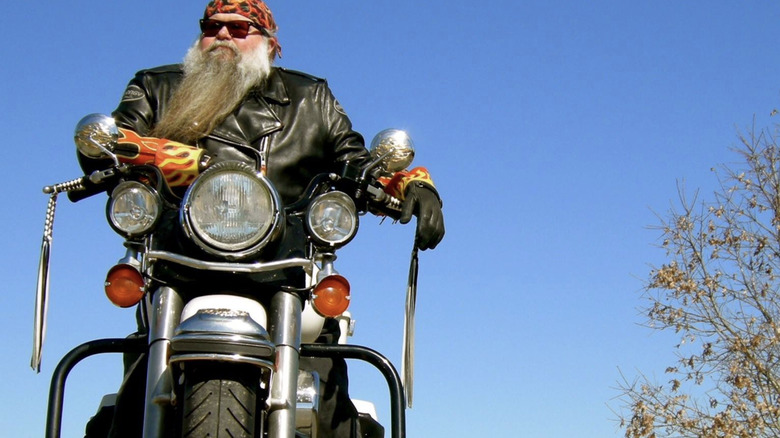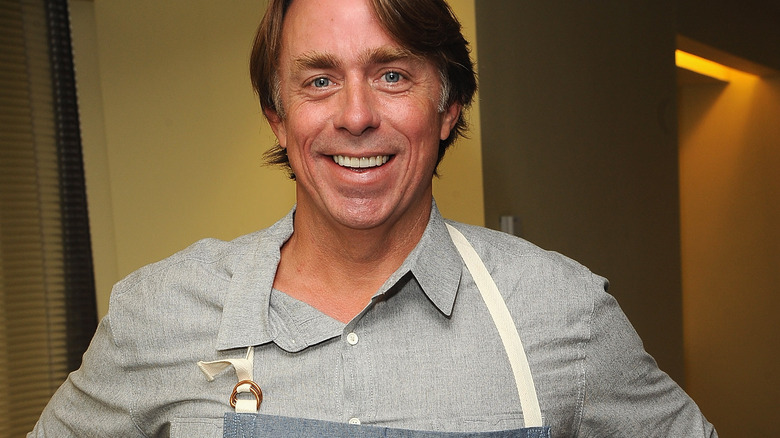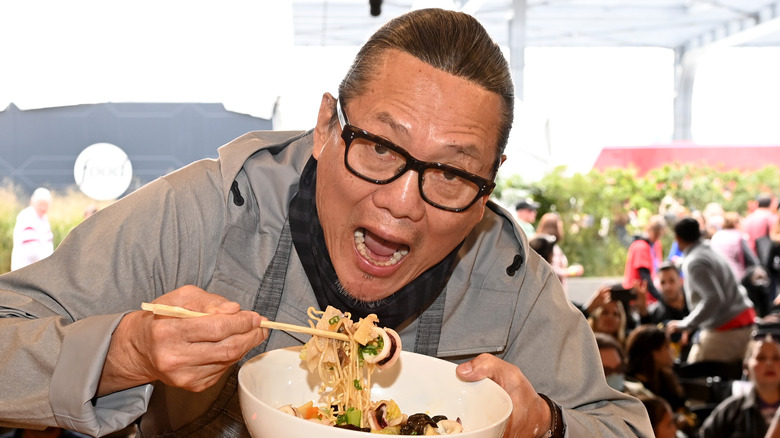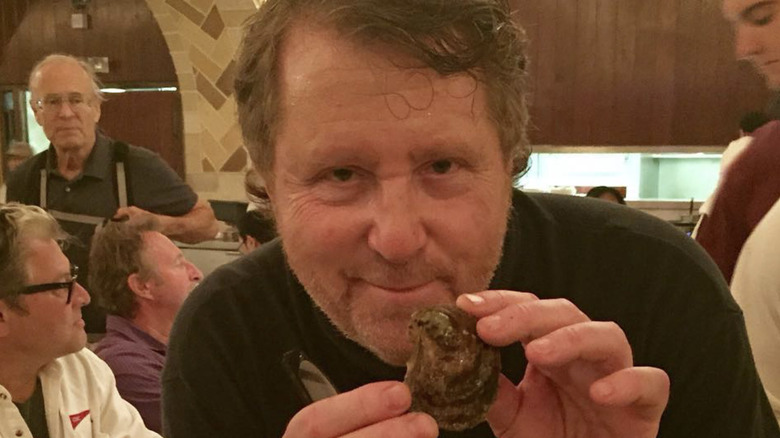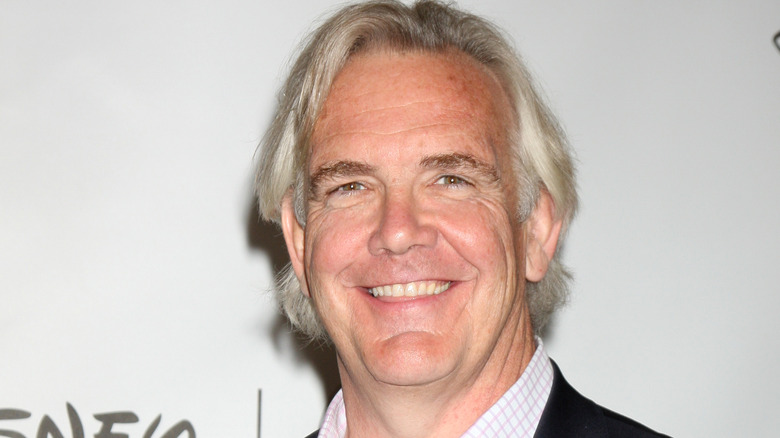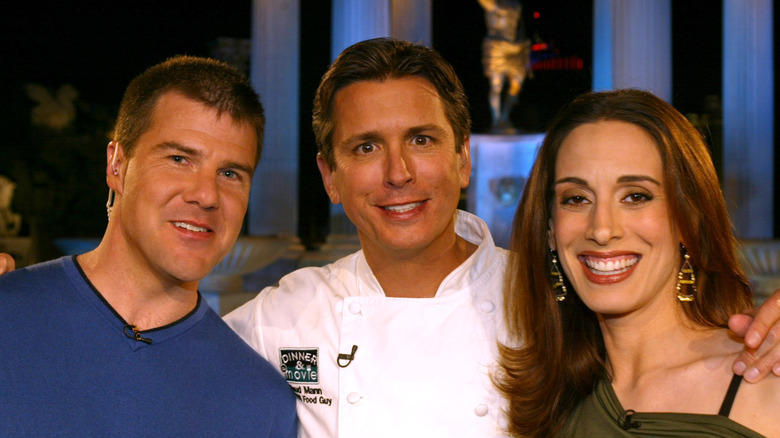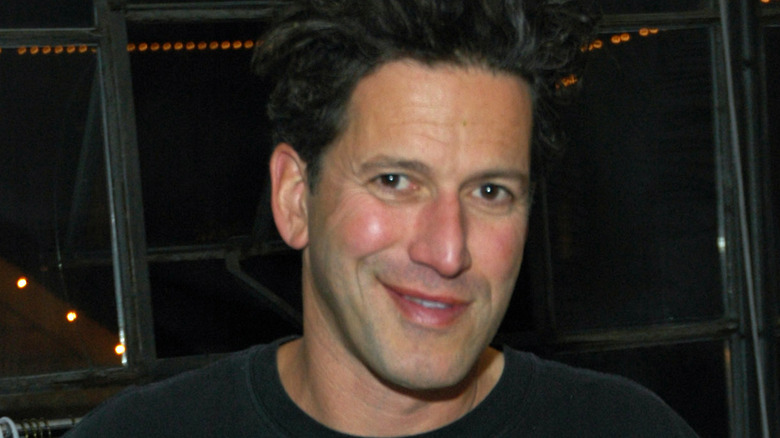Celeb Chefs From The '90s Who Completely Disappeared
Celebrity chefs have impacted food culture since the 1800s, but their influence did not become widely accessible until the mid-20th century when television shows like "The French Chef" starring Julia Child invited world-class cooks into ordinary living rooms. When Food Network launched in 1993, it was the first cable television channel to broadcast nothing but shows about food. As the success of the network gained ground, more and more of its featured chefs rose to celebrity status. There were catchphrases, product lines, and high-end restaurants. So why did some of these celebrity chefs who once appeared to have the world at their fingertips completely disappear? More importantly, where did they go?
Early Food Network notables like Sara Moulton and Ming Tsai opted to host gigs on PBS after their Food Network stints were through, while chefs like Gary Rhodes and Anthony Bourdain were active on TV up until their untimely deaths. Others, however, took a more wayward path on their way off the grid — one often marked by salacious scandal or ending in mortal tragedy. If you're curious about where some of your favorite celeb chefs from the '90s disappeared to, you've come to the right place. Read on to uncover the stories behind the vanishing acts of some of the culinary industry's unsung heroes and beloved stars.
Rocco DiSpirito bowed out from kitchen life
Back in the '90s, chef Rocco DiSpirito was just getting started. In 1997, DiSpirito quickly gained favorable media attention as the executive chef at New York City's Union Pacific, where he was applauded by food critics as one of the most creative chefs around. Food & Wine awarded him the title of "Best New Chef" in 1999. Being named "Sexiest Chef Alive" by People magazine was yet another boost to his credentials. In 2003, DiSpirito felt ready to dip a toe into reality television waters with his NBC show "The Restaurant." The documentary-style show followed Dispirito and his staff as he prepared to open his second Manhattan restaurant, Rocco's.
"The Restaurant" was a fleeting endeavor, ending just a year after it began. Around that time, DiSpirito's squabbles with the restaurant's financial backer became so heated that DiSpirito wound up legally barred from entering the restaurant he'd created. DiSpirito also cut ties with Union Pacific. He was not yet 40 years old and had turned his back on the kitchen, a place he had loved since boyhood.
The years that followed would see DiSpirito making appearances on QVC and strutting his stuff on "Dancing with the Stars" — anything but cooking. His mother's death and his own health issues kept DiSpirito out of the public eye for much of the 2010s, until he finally returned to the restaurant scene in 2018 at The Standard Grill, from which he stepped away a year later.
Emeril Lagasse's Bam! lost some of its bite
One could argue that Emeril Lagasse was the heartbeat of Food Network's early years. The vivacious and loveable chef was one of the channel's original showmen as the host of 1993's "How to Boil Water," which eventually expand into "Essence of Emeril" and the exciting "Emeril Live!" Audiences were captivated by Lagasse's fresh interpretations and zippy catchphrases like "Bam!" and "Let's kick it up a notch." When Lagasse cooked, he always looked like he was having fun.
A line of cookbooks, appliances, and spice blends followed. Lagasse wasn't just a celeb chef, he was a brand — well, at least for a while. When Food Network pulled the plug on his shows after 15 years, Lagasse sold the Emeril brand to Martha Stweart to the tune of $50 million. He appeared as a guest judge on "Top Chef" and hosted the short-lived "Eat the World with Emeril," but his TV presence, as well as the success of his many restaurants, was losing steam.
The recession of the late 2000s challenged the profitability of Lagasse's restaurants and the pandemic killed off several. One of his most well-known eateries, NOLA, never reopened. In recent times, Lagasse has made peace with slowing down, telling Esquire, "As you get older, two things either happen: You either don't get it, which you should've because life should be a learning experience, or you do get it. I'm not saying I totally get it, but I get it."
Mario Batali's reputation was tarnished beyond repair
The name Mario Batali is closely associated with the wrong side of the #MeToo movement, but in the '90s he was a well-established celebrity chef. Like Lagasse, Mario Batali cemented his fame on Food Network. His show "Molto Mario" entered the roster in 1996 and lasted eight years. From 2005 to 2009 he was an "Iron Chef America" regular. Afterward, Batali gigged as a host of ABC's cooking-talk show hybrid "The Chew."
The portly Italian chef with orange Crocs and a ponytail to match was influential in the restaurant scene as well, especially in Manhattan. Toward the late '90s, he teamed up with restaurateur Joe Bastianich to open Babbo, Casa Mono, Del Posto, and other upscale spots. These were just some of over a dozen restaurants they opened internationally, but it was in Manhattan where things went south for Batali.
In 2017, he became a target of the #MeToo movement when several women, mostly former employees, alleged that Batali sexually harassed and intimidated them. Some accused him of sexual assault. He was promptly fired from "The Chew" and plans to resurrect "Molto Mario" with Food Network were scrapped. By 2019, he was forced to step down from his restaurants. Batali and Bastianich also paid a $600,000 settlement to the employees victimized by their toxic behavior. Batali settled two more lawsuits in 2022 with women claiming he groped them in Boston. Nowadays, he has no choice but to keep a low profile.
Nicholas Gill disappeared without a trace
From an early age, chef Nicholas Gill appeared to have it all. He made a name for himself at Hambleton Hall, a quaint yet upscale hotel in the English countryside where his innovative and ornate food lured guests like Prince Charles and fellow esteemed chef, Delia Smith. In 1982, while still in his early 20s, Gill received a Michelin Star — one of the youngest Englishman to achieve this coveted milestone. Yet beneath the sheen of great promise was an emotionally unstable man struggling with a host of demons. Despite his good looks, eloquence, and early success in the high-stakes world of fine dining, Gill's personal troubles steadily compromised his talent. He began to drink heavily and dabble in drugs, which exacerbated his mood swings.
By the early '90s, Gill moved to London and was heading the Dim Sum restaurant Tall Orders. Meanwhile, his marriage was in shambles and his substance abuse mounted. He was eventually fired from Tall Orders due to his erratic behavior. Matters got worse in 1995 when he was jailed for physically assaulting his estranged wife. Upon release, Gill turned down repeated offers to return to kitchen life. Those close to him noted that the former wunderkind was a shell of his past self. In the fall of 1998, Gill told his brother — the critic and writer A.A. Gill — that he was "going away" (per Esquire). Nicholas Gill never resurfaced. He is presumed dead, but his body has not been found.
Princess Pamela was Soul Food royalty
Princess Pamela's Little Kitchen opened in 1965, as a 120-square-foot restaurant in Alphabet City, a diverse district within Manhattan's East Village. Aside from a cook assisting in the kitchen, the establishment was entirely run by Princess Pamela. Famous figures like Andy Warhol and Diana Ross ate there, but her place was nothing like a celebrity chef's kitchen. It was exclusive, but that's because there were only 15 seats in the second-story walkup. Princess Pamela — who said her given name was Pamela Strobel — served singular, heartfelt food that set her restaurant apart from anything else in New York City at the time. In short, she was a soul food trailblazer.
"Princess Pamela's Soul Food Cookbook" was published in 1969, brimming with Afro-American recipes. It included a handwritten restaurant menu and her favorite Southern-style dishes: oxtail ragu, peanut butter biscuits, and yes — roast possum. She also loved music. Stay at the restaurant late enough and Princess Pamela would slip into a spangled gold dress and red wig to serenade patrons alongside a small band of amateur jazz players.
Come 1989, the Little Kitchen relocated to a slightly larger space nearby, but when it shuttered in 1998, Princess Pamela disappeared with it, never to be seen or heard from again. It's been said that the last time Princess Pamela was spotted was outside her restaurant with policemen, suggesting that her restaurant may have faced some legal issues. Today, her fate remains a mystery.
David Ruggerio had ties to a criminal underworld
This isn't a scene from "Goodfellas," but just another day in the life of '90s celeb chef David Ruggerio. The chef's culinary status was undercut by the fact that he was born into the Gambino mob family (his birth name is Sabatino Antonio Gambino) and consequently, deeply involved in the Italian mafia. He was also the face of some of New York City's most upscale French restaurants such as Maxim's, Le Chantilly, and La Caravelle.
Television fame followed, which included the PBS series "Little Italy With David Ruggerio" and Food Network's "Ruggerio to Go." Behind the scenes, he was involved in heroin dealing, loan sharking, and murder. Recalling the halcyon days of his restaurant career in the early '90s, Ruggerio told Vanity Fair: "I was a tortured person. I knew right from wrong, but at times I couldn't stop myself."
In July of 1998, Manhattan police searched Le Chantilly on suspicion that Ruggerio was behind a credit card company defrauding scheme. Ultimately, he pled guilty to inflating diners' credit card tips, thereby cheating the company out of $190,000. The scandal led him to lose his spot on Food Network's roster, and meanwhile, his restaurants were shuttered. Ruggerio filed for bankruptcy and retreated from the public eye, only recently resurfacing. In 2014, his son, who also participated in the world of organized crime, died of a drug overdose, prompting Ruggerio to share the unbelievable details of his double life with the world.
Keith Floyd struggled behind the scenes
As Britain's resident hedonistic chef, Keith Floyd's star rose in the 1980s when BBC asked him to film a series called "Floyd On Fish" after seeing his televised short of the same name. It was an unlikely move for a man whose culinary career began in an Army mess hall decades before — but it worked. "Floyd on Fish" was only the beginning, and dozens more topics were televised. There was "Floyd on France," "Floyd Uncorked," "Floyd's American Pie," and many more.
As the '90s rolled in, Keith Floyd was a household name, adored in the U.K. for his quirky humor, floppy bowtie, and perpetual glass of red wine in hand. Sadly, the high tide of Floyd's celebrity burned out. Addiction, mental strain, and financial woes afflicted the star and bestselling author. He filed for bankruptcy after 12 of his restaurants closed. By the mid-1990s Floyd was aimless and basically retired.
He wouldn't resurface on TV until the late 2000s for a documentary called "Keith Meets Keith," in which actor Keith Allen tracks down Floyd, whom he considered a hero of sorts. On September 14, 2009, the same evening "Keith Meets Keith" was set to air on Channel 4, Floyd — who was in remission from bowel cancer — had a heart attack and died at the age of 65. Britain's biggest chefs all paid tribute.
Jeff Smith was destroyed by scandal
Anyone well-versed in vintage PBS cooking shows knows about "The Frugal Gourmet," a culturally informative series hosted by Jeff Smith, a minister turned gourmand. Smith instructed viewers on how to make all kinds of recipes for well over a decade, beginning in 1977. "The Frugal Gourmet" was a longtime hit for PBS and became a source of fame for Smith who profited off cookbooks and media appearances.
The problem was, Smith had groomed and sexually assaulted teenage boys — some as young as 14 — since the 1970s. Reports of his predatory behavior date back to his life before "The Frugal Gourmet," when he ran the Chaplain's Pantry, a deli in Tacoma, Washington. Although some publications reported that Smith's pedophilia was known among Tacoma locals in those days, the accusations didn't gain traction until the 1990s when several of his accusers went public. Upwards of 20 men filed suit against Smith, describing instances of groping, kissing, and rape.
Smith was unable to subvert the unwanted media attention of these lawsuits and paid the price. PBS took "The Frugal Gourmet" off the air in 1995, ending the once prolific chef's career. In 1998, just days before he was set to stand trial, Smith settled out of court, paying an undisclosed amount to seven of the men who were suing him. His final years were lived away from the cameras, and he died of heart disease in 2004 at the age of 65.
Two Fat Ladies' time was cut short
Clarissa Dickson Wright and Jennifer Paterson, better known to their fanbase as "Two Fat Ladies," were the deliciously snarky British cooks and faces of the 1996 BBC2 show by the same name. The show's premise was simple: Paterson operated a Triumph Thunderbird motorcycle while Dickson Wright enjoyed the pastoral views from her seat in the double-wide Watsonian Jubilee sidecar. Together, they surveyed Great Britain's rural land, prowling for exceptional ingredients to make rustic recipes in (usually antique) kitchens.
Dickson Wright and Paterson quickly found favor in the U.S. as well. PBS and Food Network regularly aired "Two Fat Ladies" in the '90s, and it's still in syndication to this day. In their plucky yet unassuming way, Dickson and Paterson stuffed monkfish with anchovies and foraged for mussels on a damp Cornwall beach like it was the most natural thing in the world. They made peculiar places and recipes accessible, cracked jokes with the locals, and seemed to be enjoying life.
That changed in 1999 when Paterson was diagnosed with lung cancer and died that same year. The show was in its fourth season and came to a screeching halt. Dickson Wright would go on to film the television show "Clarissa and the Countrymen" in the early 2000s but never took to the spotlight again the way she did with "Two Fat Ladies." She passed away in 2014.
Joël Robuchon: The legend who hung up his apron
In the 1970s, Chef Joël Robuchon was successfully working in some of the most respected haute cuisine kitchens of his native France. At the time, fine dining and French food were near exchangeable terms — the fanciest restaurants around the world championed Parisian influence, which far too often entailed overworked courses consumed in flagrantly pretentious environments. Robuchon wasn't feeling it. The talented young chef appreciated truffles and caviar as much as the next discerning Frenchman, but he felt they could be celebrated as part of simpler dishes where clear, robust flavors took precedence over try-hard plating techniques.
Enter the mashed potato. Too modest? Perhaps, until it passed through Robuchon's hands. It was an unlikely signature dish for someone with Robuchon's level of skill, but the consensus was that his rich, whisked-to-perfection mashed potatoes epitomized world-class. So why, after being named "Chef of the Century" by the "Gault et Millau" cooking guide in 1990 did Robuchon hang it all up?
Robuchon claimed that he'd never seen a snowy mountaintop because he was too busy working, and he wanted to spend time in nature and with his family. Years later he was back, opening restaurants in Paris, Tokyo, and New York and earning a pile of Michelin stars in the process. He was Michelin's most decorated chef of all time in 2016 having earned 32 stars. Eventually, in 2018, Robuchon died from cancer.
Did Biker Billy ride off into the sunset?
If the moniker "Biker Billy" is unfamiliar, you probably never watched "Biker Billy Cooks with Fire," a public access show with a niche following in the 1990s. Biker Billy — whose real name is Bill Hufnagle — stood out from other celeb chefs of the day. First, he quite literally looked as if he filmed cooking segments between motorcycle rides, clad in black sunglasses and casual clothing. While the majority of '90s chefs went for a clean-cut look, Biker Billy's bushy beard pointed toward his chest and his hair grazed his belt loops.
Everything about "Biker Billy Cooks with Fire" was decidedly low-budget. The set was a plain black background and the video quality was fuzzy. He used disposable plates and bowls, dried herbs from store-bought containers, and cooked on an electric hot plate that was more suited to a campground than a professional chef's counter. Still, Biker Billy had fans who tuned in to watch his informal and enthusiastic tutorials characterized by a preference for pepper-heavy, vegetarian-friendly foods.
In 2016, the former TV host and cookbook author's public presence had become so diminished that word began to spread online that he was dead. Biker Billy addressed the rumors on his blog in a post titled, "The rumors of my death have been greatly exaggerated." As of 2023, his last blog post was in 2017.
John Besh stepped out of the spotlight
Louisiana-based chef John Besh gained favorable publicity for his standout culinary skills by making Food & Wine's list of "Best New Chefs" in 1999. Within two years, he opened his first restaurant, the highly-rated August, in New Orleans — a city close to his heart. Life was good for Besh, a proud family man who based one of his cooking shows "Chef John Besh's Family Table" and a cookbook "My Family Table: A Passionate Plea For Home Cooking" on that very sentiment.
It would take more than a family-friendly image to pull Besh out of the world of scandal he found himself in when a 2017 investigation substantiated a flurry of reports that his Besh Restaurant Group was a cesspool of sexual harassment and other disconcerting behaviors toward women. The allegations also disclosed that Besh had engaged in an extra-marital affair. Distraught, Besh released a statement: "I have been seeking to rebuild my marriage and come to terms with my reckless actions" (via The Times-Picayune). Even so, Besh stepped down from his position as Chief Executive Officer of Besh Restaurant Group. Fellow celeb chefs like Aarón Sánchez cut ties with Besh. His official website and social media accounts are nothing but dead air, and Besh's last public comments date back to September 2017.
Graham Kerr moved to a new medium
Unlike many other chefs on this list, Graham Kerr rose to fame well before the 1990s. The British chef first graced the television screen way back in 1968 with the debut of his cooking show, "The Galloping Gourmet." Kerr's humorous remarks and upbeat demeanor helped make the series a hit before it came to a sudden end. The show was canceled after Kerr and his wife Treena were severely injured in a 1971 car crash and a series of medical diagnoses caused trouble for Treena. In 1975, Kerr even told the Eugene Register-Guard that he regretted the fattening recipes and off-color jokes of his old series.
Kerr made various television appearances over the next two decades, but came back in a major way in the 1990s. In 1992, he debuted his new show, "Graham Kerr's Kitchen." The show produced 75 episodes over three seasons before coming to a close in 1994. The following year, he filmed a special with Julia Child, "Julia Child and Graham Kerr: Cooking in Concert." That was more or less the end of his television career.
Since the 1990s, Kerr has been mostly out of the spotlight, but he's kept himself busy writing. The famed chef has published six books since 2000. This includes his 2015 memoir, "Flash of Silver," and a re-released edition of his famous cookbook, "The Graham Kerr Cookbook."
Masaharu Morimoto stepped back from his restaurants to focus on other products
Masaharu Morimoto trained in Japanese sushi preparation, opening a restaurant at age 24 before moving to the United States in 1985. There he joined the staff of New York's illustrious Japanese restaurant Nobu, where he became executive chef. The high-profile eatery earned Morimoto attention from TV producers who recruited him to be part of the original, Japan-focused slate of competitive cooks on "Iron Chef" in 1998. A master of Japanese cuisine, Morimoto considers his food to be more of a fusion, combining different world cuisines to create something new, a blend of Japanese, Chinese, and French traditions.
Made famous worldwide by "Iron Chef," Morimoto started opening restaurants in the 2000s, launching eponymous establishments in New York, Napa, Hawaii, Florida, India, Mexico City, and Japan. At one point, he had a hand in around 20 restaurants. One of his places, Bisutoro in New York, closed down for good in 2004, just after Morimoto left to devote more time to his branded products. Under the Morimoto and Momosan names, the chef created beer, wine, sake, grapeseed oil, miso soup, instant ramen, and, during COVID-19, face masks. Subsequently, Morimoto didn't appear much on TV in the late 2010s, apart from the occasional cameo on an "Iron Chef" series, but he returned to host and judge the Roku Channel original "Morimoto's Sushi Master" in 2023.
David Rosengarten went back to writing
When Food Network began operations in the early 1990s, one of its most prominent and prolific on-air hosts was cookbook author, travel writer, and culinary competition judge David Rosengarten. He appeared on about 2,500 individual episodes of Food Network shows, mostly in the '90s, including shows like "Taste," "Food News and Views," and "In Food Today."
After Food Network grew more chef- and personality-focused in the 2000s and beyond, Rosengarten largely left TV behind and leaned into his experience in journalism, concentrating on food, food-adjacent topics, and fine wines. He served as an editor of Gourmet and wrote for Food and Wine, Saveur, Wine Enthusiast, The Splendid Table, and Bon Appétit, in addition to running the food news service The Rosengarten Report. The former TV host has published five books, and his 2003 work "It's All American Food" won a James Beard Award. The last time Rosengarten popped up on a Food Network show was as a judge on "Iron Chef America" in 2012.
Gordon Elliott became a producer
Born in England and raised in Australia, the outwardly gregarious and curious Gordon Elliott first found fame as a general broadcaster, hosting "Good Morning Australia" and the U.S. version of the news magazine "A Current Affair." In the 1990s, Elliott presided over a talk show bearing his name before entering the realm of food television. For Food Network, he hosted the documentary series "Follow That Food" and the off-the-cuff cooking show "Doorknock Dinners," where he brought a chef into real peoples' homes to make the occupants a dinner out of whatever they had on hand.
After creating Follow Productions, Elliott moved from in front of the camera to the creation side, producing personality-driven cooking shows for Food Network and making stars out of many of his collaborators. Elliott produced "Paula [Deen]'s Home Cooking," "Semi-Homemade Cooking with Sandra Lee," and "Down Home with the Neelys." From 2011 to 2018, Elliott organized and announced the ABC daytime food magazine series "The Chew."
Claud Mann became an advocate for healthy school meals
For a decade and a half, "Dinner & a Movie" was a programming staple for cable network TBS. In between segments of a popular movie, studio hosts would show viewers how to cook recipes cheekily inspired by the film of the day. While the hosts changed throughout the 1996 to 2011 run — comic Paul Gilmartin was variously joined by Annabelle Gurwitch, Lisa Arch (née Kushell), and Janet Varney — the chef in charge of the meal remained constant: Claud Mann. In the mid-'90s, Mann was the executive chef at a restaurant in Los Angeles, and after he started a food consultancy firm, TBS noticed and recruited him to anchor "Dinner and a Movie." He'd wind up filming 900 episodes of the series.
"It eventually ran its course and then I went into kids' health," Mann told Ojai Magazine regarding the end of the show and what he did next. He'd eventually return to the food world, however, owning and helping operate a bakery in California called Ojai Rôtie. Mann makes several hundred bread loaves weekly, sold in the store and at a local farmers' market.
Bob Blumer left his Airstream kitchen for Los Angeles
When the Food Network was still finding its footing, the service threw a lot of ideas out to enliven its lineup of cooking instructional shows. One of those TV-first concepts was a show called "The Surreal Gourmet," hosted by Canadian food personality Bob Blumer and based on his popular '90s cookbook series of the same name. From his brightly-colored, gadget-laden kitchen built out of an Airstream trailer topped with giant slices of fake toast, Blumer offered inventive spins on home-cooked recipes – most famously, salmon prepared in a dishwasher.
"The Surreal Gourmet" ended production in 2011, and Blumer moved to Los Angeles, close to the machinery of television creation. He last hosted and produced programs more than a decade ago, like "Glutton for Punishment" and "World's Weirdest Restaurant." In the 2020s, he occasionally appears on Canadian TV programs, including "The Marilyn Denis Show" and "Baroness Von Sketch Show." Blumer quietly published a more traditional cookbook called "Flavorbomb" in 2020.

